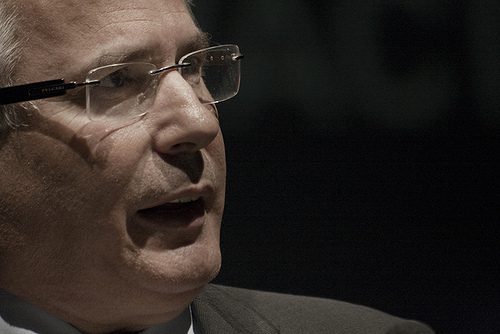Today is the last of the three days for testimony before the Supreme Court in the case against Judge Baltasar Garzón. LoR Contributor Pia Navazo reports.
The trial, one of three cases facing Judge Garzón, alleges the Judge abused his powers and violated Spain’s 1977 Amnesty Law by accepting to investigate crimes committed during the Franco era and the Spanish Civil war. Families of the disappeared and representatives of associations in favor of the investigation have been testifying in Court at the request of Judge Garzón’s defense, who seeks to demonstrate that he did not committ “malfeasance” (the technical charge) when he accepted to investigate the case.
Thursday, the trial will continue with the examination of the public accusations filed in this case, which is a private prosecution, as well as those of the defense and the State Prosecutor (who requests the annulment of the trial). After declarations are finished, the President of the Supreme Court, Mr. Carlos Granados, will give the parties a final opportunity to modify their initial statements. That will be the last opportunity for Judge Garzón to appear in Court and defend his innocence. At that point the trial awaits only the ruling from the Supreme Court.
Witnesses called by Judge Garzón have been testifying for the past three days. One of them described how the association he represents had requested justice before Argentinian Courts, as he is prevented from doing so in Spain, an in interesting reversal of roles for Spanish justice (Garzón is most well known for having sought to prosecute Chilean dicator Augusto Pinochet).
Judge Garzón’s accusers told the court that a 1998 ruling of Judge Garzón refused jurisdiction to investigate crimes committed in a famous civil war incident in 1936 known as Paracuellos. That case may involve crimes that could well amount to crimes against humanity, principally killing of Franco-loyalist prisoners. The private prosecution alleges that Judge Garzón ruled that investigation was prohibited by a statute of limitations on the crimes and that he abused hus power in his treatment of the two right-wing victims associations (Asociación de Familiares and Amigos de Víctimas de Genocidio en Paracuellos del Jarama), accusing them of bad faith, of trying to abuse their right to jurisdiction, to ridicule tbe law and to use it for different purposes (i.e. political purposes).
The private prosecution notes that it is remarkable that the person alleged to have been most responsible, a former Spanish Communist Party (PCE) leader Mr. Santiago Carrillo,is still alive and freely participating in society, having received several distinctions and honours.
International observers continue to appear in Madrid and express their concerns about the case and the international press has been covering it as well. Most recently, The Guardian questioned the credibility of the case and the New York Times highlighted the shadows of political show-trial which haunt the case.
It is beyond ironic that the judge who successfully prosecuted crimes against humanity and gave a dynamic dimension to extraterritorial jurisdiction is being judged for trying to apply the same principles at his home country. But polemics aside, this case has little to do with Garzón’s attempt to exercise jurisdiction or a resulting need to discipline him.
But beyond politics, ideologies, vengeances or past decisions, what is at issue here is whether Spain is going to impede an investigation regarding crimes against humanity. Whether Spain is ready to tell the truth and open the past. Whether Spain is ready to comply with international law and provide reparation to victims.
The Supreme Court appears to be as divided (an early motion to dismiss the case was approved by a minimum majority of one vote) as Spanish society is divided.
It is time that Spain faces its past and seeks justice, regardless ideological differences.
Pia Navazo
Image: elfer

